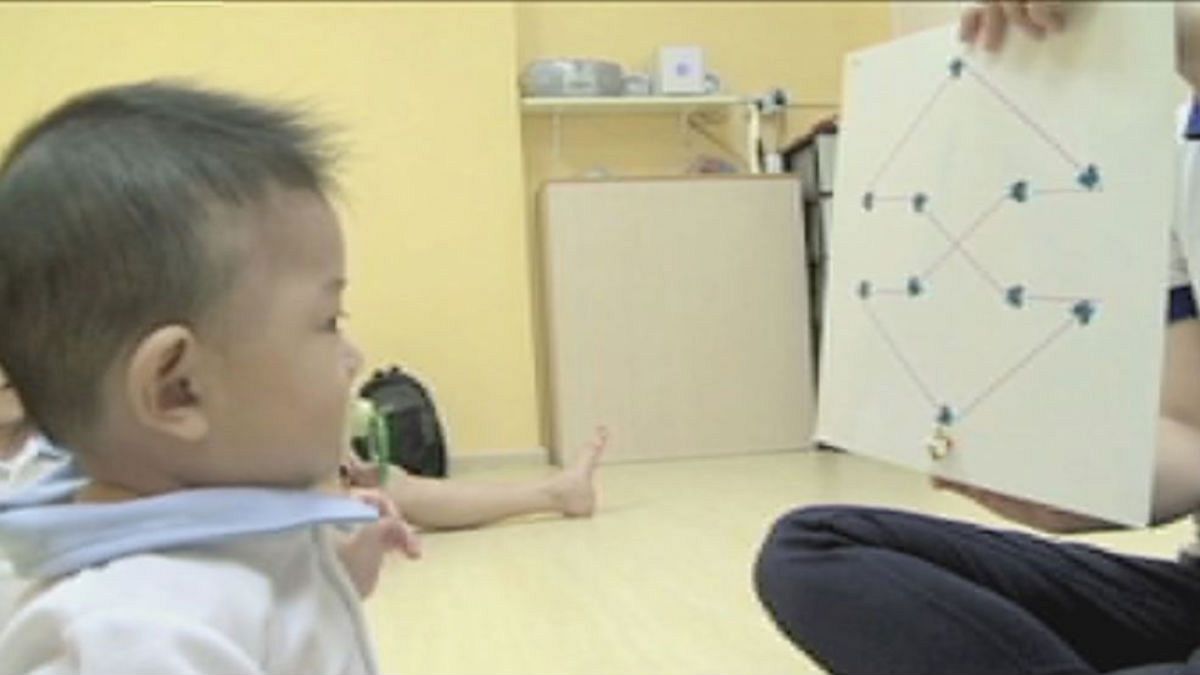It is an eternal question – do children really benefit from learning at a very early age?
Head, heart and hand, India
Avnika Menon goes to Leapbridge International Preschool in Pune, India.
Her father, Sushant Menon, said: “I noticed my daughter was not very social, she was hesitant to talk to people. So, I thought maybe we were doing something wrong. She needed a platform from which to explore, learn new things, mingle with people, she needed school.”
The teaching at Leapbridge School is partly based on the multiple intelligence theory developed by Howard Gardner. They also take ideas from Freidrich Frobel’s play way method and Montessori and incorporate Mahatma Gandhi’s 3H philosophy, that is involving the head, heart and hand.
The pre-schoolers at Leapbridge learn practical life skills like cleanliness, hygiene, and keeping things tidy. They also experiment with colours and shapes and the children do physical exercise aimed at fine tuning their motor skills.
Director Academics, Priiety Gosalia told euronews: “A lot of concentration is on the child and their learning pattern. So they learn by hands-on experience, they actually get things to explore, to touch, to feel, to taste, to understand and go wrong. Children need to go wrong, because they cannot always be correct, so we allow the child to freely do those things with lot of repetition, lot of variety and innovation.”
Brain boosting, Singapore
More than 360,000 babies are born every day on the planet and many parents see education as the main factor in their children’s success later on in life. So much so, that for some children education starts almost at birth.
The Baby Jumper Gym in Singapore, a child enrichment centre, aims to encourage babies’ brains to grow. Teachers there use brain stimulating techniques to foster children’s mental and physical skills. They aim to stimulate young brains as much as possible.
The curriculum covers all sorts of mental and physical skills using left and right brain training techniques aimed at accelerating learning power, and teaching social and independent skills.
Erika Leung, the director said: “Basically, what we do is provide the whole brain stimulation, so we teach flash cards to these babies and children, and we also expose them to different kinds of activities in one session: starting from music, mathematics, learning language, second language and also physical activities and fine motor skills, in one session with the parents involve in the classroom.”
The staff believe that every baby is born a genius, and that with the right educating technique and the right environment, parents can guide their babies towards better and faster learning.
Visual stimulation is thought to boost learning by developing and sharpening the right brain’s visualisation skill, intuition and creativity.
Erika Leung, the director of the Baby Jumper Gym explained: “What we do is to show them one card and then we show them two cards and they will point us which one was shown in the first time. This is basically to train the photographic memory, right brain stimulation.”
The theory goes that because a baby’s brain triples in size during the first two years of its life, this is the right time to start educating a child.
A parent whose child attends the centre said, “Everybody starts young, all the CEO now are very young, during our times CEOs were so old and presidents were so old. Nowadays everybody is so young. So, the way we see this today is that if we don’t start early then maybe it’s too late.”
They also try to give babies physical skills to improve agility.
“Let them play”, says Kathy Hirsh-Pasek
But not everyone agrees with extreme early learning. Kathy Hirsh-Pasek is a child psychologist at Temple University in Philadelphia and authority on early development psychology who has studied what happens in babies’ minds before they learn to speak. She uses a system of deciphering facial reactions to visual stimuli.
Hirsh-Pasek, who has three sons, defends the importance of playing and relaxing in children’s lives and believes that early stimulation programmes can backfire: pushing too hard too early can put children off learning.
She said: “All of the early stimulation programmes, whether in school or by flash-cards, are totally unnecessary for children. If you look at the world around us, you are seeing amazing natural experiments at every twist and every turn. When you are watching the leaves blowing in the wind you are looking at a physics experiment. When children have to learn how to get along, which is one of the best predictors of how they are going to do in school, well, learning to get along happens when they are playing in the sand-box. We have a learning illusion, that the only way we can get our children ready to learn is to jump evolution, and give them flash-card after flash-card, and they will be better learners. Nothing could be further from the truth.”
She added, “We even know that in rats playtime is very important! For rats! So we must probably guess that if an entire species, all mammals play – and I have even been told recently that even fish play – it probably has some utility to the species!”
More information here: ultimateblockparty.com/
